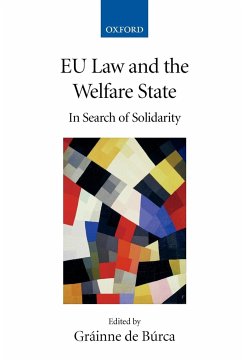
Eu Law and the Welfare State
In Search of Solidarity
Ed. by Búrca, Gráinne de
Versandkostenfrei!
Versandfertig in 1-2 Wochen
102,99 €
inkl. MwSt.

PAYBACK Punkte
51 °P sammeln!
This book contains a set of essays which examine different aspects of the impact of European Union law on national welfare state systems. Each chapter looks at a different dimension of the subject: the effect of the Charter of Fundamental Rights and its provisions on solidarity, equality and citizenship, the impact of internal market freedoms on the right to cross-border health care, the effect of competition law on national public services, and elements of the Lisbon Agenda and
its 'open coordination' mechanism on the European Social Model.
its 'open coordination' mechanism on the European Social Model.
This collection of essays addresses a topical subject of current importance, namely the impact of the EU on national welfare state systems. The volume aims to question the perception that matters of social welfare remain for Member States of the EU to decide, and that the EU's influence in this field is minor or incidental.
The various essays trace the different ways in which the EU is having an impact on the laws and practices of the Member States in the area of welfare, looking at issues of social citizenship and the influence of the Charter of Fundamental Rights, as well as at the impact of EU economic freedoms - competition law and free movement law in particular - on both 'services of general economic interest' and on national health-care systems. The significance of the so-called Open Method of Coordination
in developing a new compromise on 'social Europe' is discussed, as well as the tensions between market liberalization and social protection in the specific context of this transnational political system are examined.
While the various authors clearly have different views on the likelihood of a robust form of European social solidarity developing, the book as a whole suggests the emergence of a distinctive, although partial and fragmented, European Union welfare dimension.
The various essays trace the different ways in which the EU is having an impact on the laws and practices of the Member States in the area of welfare, looking at issues of social citizenship and the influence of the Charter of Fundamental Rights, as well as at the impact of EU economic freedoms - competition law and free movement law in particular - on both 'services of general economic interest' and on national health-care systems. The significance of the so-called Open Method of Coordination
in developing a new compromise on 'social Europe' is discussed, as well as the tensions between market liberalization and social protection in the specific context of this transnational political system are examined.
While the various authors clearly have different views on the likelihood of a robust form of European social solidarity developing, the book as a whole suggests the emergence of a distinctive, although partial and fragmented, European Union welfare dimension.












